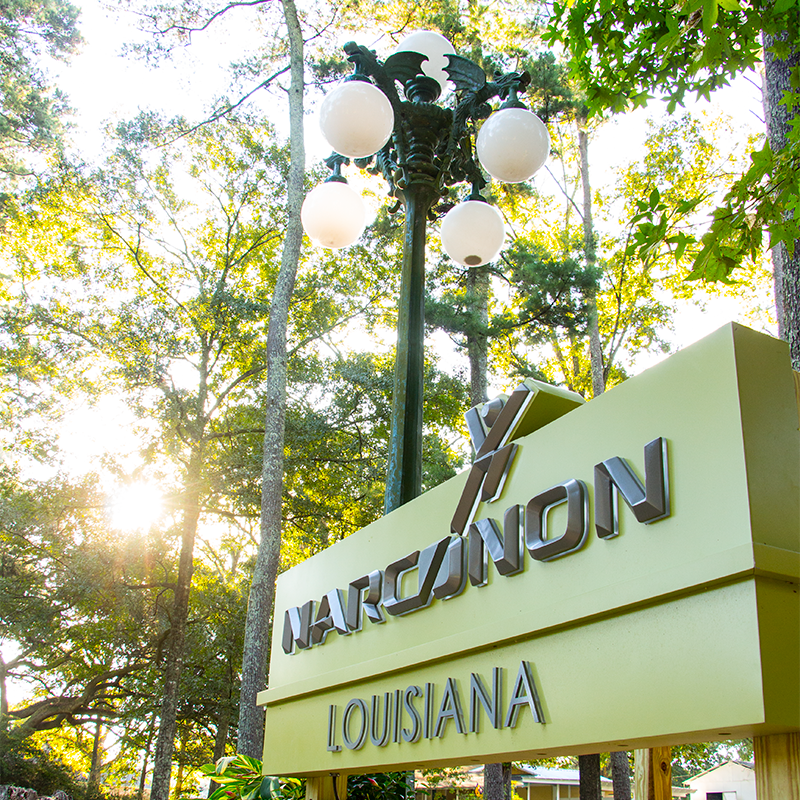Narconon - New Life Retreat


Overview
Narconon - New Life Retreat is a substance abuse treatment center for people seeking treatment near Livingston County. As part of their treatment modalities for recovery, Narconon - New Life Retreat provides substance use disorder counseling during treatment. Narconon - New Life Retreat is located in Denham Springs, Louisiana, accepting cash or self-payment for treatment.
Narconon - New Life Retreat at a Glance
Payment Options
- Cash or self-payment
- Private health insurance
- Aetna
- Blue Cross and Blue Shield Association
- Cigna
Assessments
- Screening for tobacco use
- Comprehensive substance use assessment
- Outreach to persons in the community
- Screening for substance use
- Professional interventionist/educational consultant
Age Groups
- Young adults
- Adults
Ancillary Services
- Social skills development
- Transportation assistance
Accreditations
SAMHSA certification for opioid treatment program (OTP):
SAMHSA's Opioid Treatment Programs (OTPs) accreditation is a rigorous recognition process that signifies an OTP's commitment to providing high-quality care for individuals dealing with opioid use disorders. It assures patients, families, and the community that the program adheres to evidence-based practices, employs qualified staff, and maintains a safe treatment environment. This accreditation is a symbol of quality and accountability, offering confidence in the program's ability to support individuals on their path to recovery from opioid addiction.
State department of health:

Government agencies issue State Licenses, granting rehabilitation organizations permission to operate their businesses lawfully within specific geographic regions. The specific licenses needed for legal operation are typically determined by the type of rehabilitation program offered by the facility and its physical location.
LegitScript:

LegitScript certification is awarded to programs and services that successfully complete a stringent application process initiated in 2018. This process ensures eligibility for credible providers offering mental health and co-occurring substance abuse treatment within Google's network while complying with HIPAA privacy laws.
Treatment At Narconon - New Life Retreat

Conditions Treated
24-Hour Clinical Care:
At certain points in the recovery process, it's important to have support available 24/7. 24-hour clinical care offers a safe environment in which to recover from drug or alcohol addiction in peace, knowing medical detox and other treatment will happen with professionals on hand.
Alcoholism:
Alcohol addiction is a disease that changes the way the brain works. It causes negative emotions, impulsive behavior, cravings and withdrawal symptoms. Treatment for alcohol addiction includes supervised detox, counseling and therapy, and support group participation. Rehabilitation does not cure alcoholism. Instead, it helps the individual manage their addiction, restore their functioning, and well-being.
Substance use treatment:
Substance use rehabilitation represents a holistic treatment strategy tailored to aid individuals grappling with drug or alcohol addiction. This comprehensive rehabilitation method encompasses two key aspects: first, addressing the physical dependency, often commencing with detoxification, and second, tackling the psychological triggers through a range of therapeutic techniques. The ultimate aim is to empower individuals to attain and sustain sobriety while providing them with the necessary skills and coping mechanisms to successfully reintegrate into society and lead a life free from substance abuse.

Levels Of Care
Hospital inpatient treatment:
Inpatient treatment involves a comprehensive residential therapeutic program where patients stay on-site for a duration typically ranging from 30 to 90 days. This immersive environment offers structured support, ensuring safety and a focus on recovery. Therapies provided include individual and group counseling, cognitive-behavioral therapy, holistic treatments, family therapy sessions, and experiential therapies. The aim is to address addiction or mental health disorders' physical, emotional, and psychological aspects, laying a robust foundation for sustained healing.
Outpatient:
Outpatient programs are designed for individuals in stable medical condition with a low risk of relapse, often those who've completed inpatient treatment. These programs extend the foundation of prior treatment approaches, offering continuous addiction guidance and resources for sustained recovery. For those transitioning straight from detox, medical and psychological assessments are typically conducted, leading to the development of individualized treatment strategies. The majority of outpatient rehab centers provide diverse care levels, customized to each client's unique requirements.
Short-term residential:
Short-term residential rehab is a brief, intensive program for individuals seeking help with substance abuse. Unlike long-term rehab, it offers a more condensed stay, typically a few weeks to a few months. Short-term programs focus on rapid stabilization and intensive treatment, making them suitable for those with time constraints or responsibilities. They provide 24/7 care, counseling, and support, helping individuals develop coping skills and a foundation for recovery in a shorter timeframe compared to long-term rehab.
Long-term residential:
Long-Term Residential provides an immersive treatment environment where individuals battling addiction stay on-site for extended periods. These facilities emphasize recovery and rehabilitation through structured routines, therapeutic interventions, and round-the-clock support from professionals. The extended duration, often ranging from several months to a couple of years, allows patients to deeply address root causes of their addiction and develop robust coping strategies.
Outpatient day treatment or partial hospitalization:
Outpatient day treatment or partial hospitalization level of care is a type of mental health treatment that provides a high level of care outside of a traditional inpatient setting. It typically involves intensive therapy and support services for several hours each day, several days per week. This level of care is designed for individuals who require more support than traditional outpatient therapy but do not need 24-hour inpatient care.
Intensive outpatient treatment:
Intensive outpatient programs (IOPs) support clients in maintaining long-term sobriety by providing tailored, high-quality care that adapts to their changing requirements. Clients participate in several treatment sessions each week, typically receiving between nine to 20 hours of outpatient care weekly. As clients achieve stability, the treatment frequency and intensity gradually diminish. Many intensive outpatient rehabilitation centers provide a diverse range of services, such as addiction counseling, training in life skills geared towards recovery, and the option for medication-assisted treatment (MAT). Additionally, evidence-based complementary therapies are frequently integrated into the program.
Regular outpatient treatment:
Regular Outpatient Treatment is a flexible and accessible option for individuals seeking recovery from addiction or substance abuse. This program typically involves attending therapy and counseling sessions on a part-time basis, often ranging from one to three sessions per week. These sessions are designed to provide essential support, guidance, and tools for individuals to overcome addiction, manage cravings, and work towards a healthier, sober lifestyle. Regular Outpatient Treatment offers the advantage of maintaining daily routines and responsibilities while receiving the necessary therapeutic interventions to foster lasting recovery.
Hospital inpatient/24-hour hospital inpatient:
At specific stages of the recovery journey, having round-the-clock support becomes crucial. 24-hour clinical care provides a secure environment for individuals to heal from drug or alcohol addiction, with the assurance that medical detox and other treatments will be administered by professionals at any time.
Aftercare:
Finishing a drug or alcohol rehab program is not the conclusion of substance abuse treatment but rather a pivotal step toward long-term recovery. Aftercare encompasses devising a sustainable recovery plan coupled with enduring support. It may include sober living environments such as halfway houses, career counseling, and connecting patients with community support programs like Alcoholics Anonymous (AA) or Narcotics Anonymous (NA). This holistic approach ensures a smooth transition into a substance-free life while bolstering resilience against relapse.

Treatment Modalities
Substance use disorder counseling:
Substance use disorder counseling treatment modalities refer to various approaches and methods used in the counseling and treatment of individuals with substance use problems. This can include individual therapy, group therapy, cognitive behavioral therapy, motivational interviewing, family therapy, and 12-step programs. The goal is to help the individual overcome their substance use, develop healthy coping skills, and lead a fulfilling life in recovery.
Smoking/vaping/tobacco cessation counseling:
Vaping Cessation Counseling is a supportive process aimed at assisting individuals who wish to quit vaping. Through personalized sessions, trained counselors help identify triggers, manage withdrawal symptoms, and develop coping strategies. This service empowers individuals to break free from vaping addiction and work towards achieving a healthier lifestyle.
Group counseling:
Group Counseling is a therapeutic approach where individuals come together under the guidance of a trained counselor to share experiences, provide mutual support, and gain insights. It fosters a sense of community, promotes understanding through diverse perspectives, and offers personal growth and problem-solving strategies.
Family counseling:
Family Counseling is a therapeutic service that addresses and resolves conflicts, improves communication, and fosters better relationships within a family unit. Through guided discussions, a trained counselor helps family members gain insight into their dynamics, learn coping strategies, and work towards creating a harmonious living environment. Family Counseling can be a significant step towards improving the overall emotional health and interactions among family members, helping them navigate challenges together in a supportive and constructive manner.
Marital/couples counseling:
Marital/couples counseling treatment modalities refer to various therapeutic approaches used to help couples resolve conflicts, improve communication, and strengthen their relationship. These modalities can include cognitive-behavioral therapy, emotionally focused therapy, solution-focused therapy, and integrative approaches. The goal of these treatments is to help couples identify and address underlying issues and develop healthy relationship dynamics.
Intervention Services:
Intervention Services are professional services aimed at addressing and amending harmful behaviors or situations, primarily in individuals struggling with addiction or other serious issues. These services guide and support both individuals and their loved ones through the intervention process, wherein a structured, solution-oriented conversation is held to encourage the individual to accept help and make positive changes towards recovery. By blending compassionate understanding with a well-formulated approach, intervention services play a crucial role in bridging the gap between acknowledgment of an issue and taking the initial steps towards resolution.
Motivational interviewing:
Motivational Interviewing (MI) is a clinical approach to helping people with substance abuse issues and other conditions shift behavior in positive ways. It is more goal-oriented than traditional psychotherapy, as MI counselors directly attempt to get clients to consider making behavioral change (rather than wait for them to come to conclusions themselves). Its primary purpose is to resolve ambivalence and help clients become able to make healthy choices freely.
Anger management:
"Anger Management" refers to a set of techniques and strategies designed to help individuals recognize and control their anger. Through a combination of cognitive behavioral therapy, self-awareness exercises, and coping mechanisms, individuals can better understand the triggers and reactions associated with their anger, ensuring they respond more positively and constructively. Effective anger management prevents potential conflicts and outbursts and promotes healthier relationships and emotional well-being.
Individual psychotherapy:
In individual therapy, a person engages in a one-on-one session with a qualified therapist or counselor. This therapeutic approach is crucial in successful substance abuse treatment because it delves into the underlying causes of addiction, addressing issues the individual may encounter in their familial, social, and professional or academic environments.
Ancillary Services
Additional Services
- Pharmacotherapies administered during treatment
- Mentoring/peer support
- Breathalyzer or blood alcohol testing
Contact Information
DISCLAIMER: The facility name, logo and brand are the property and registered trademarks of Narconon - New Life Retreat, and are being used for identification and informational purposes only. Use of these names, logos and brands shall not imply endorsement. BetterAddictionCare.com is not affiliated with or sponsored by Narconon - New Life Retreat.

